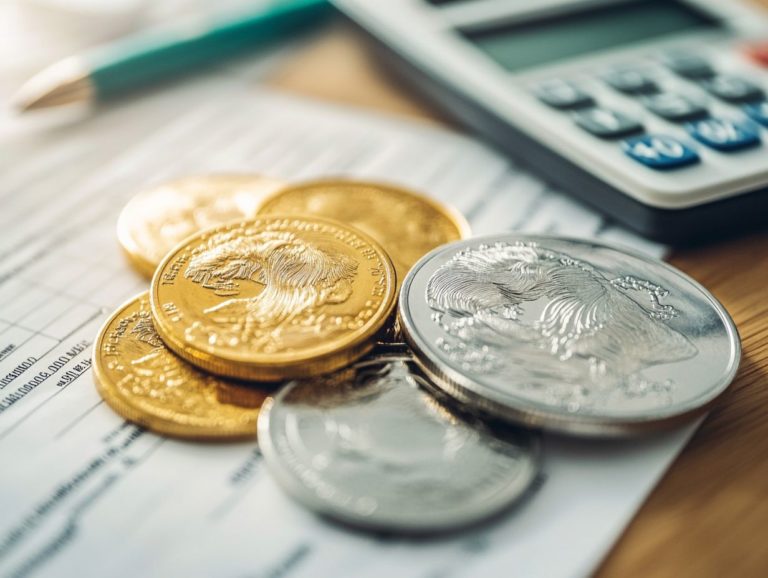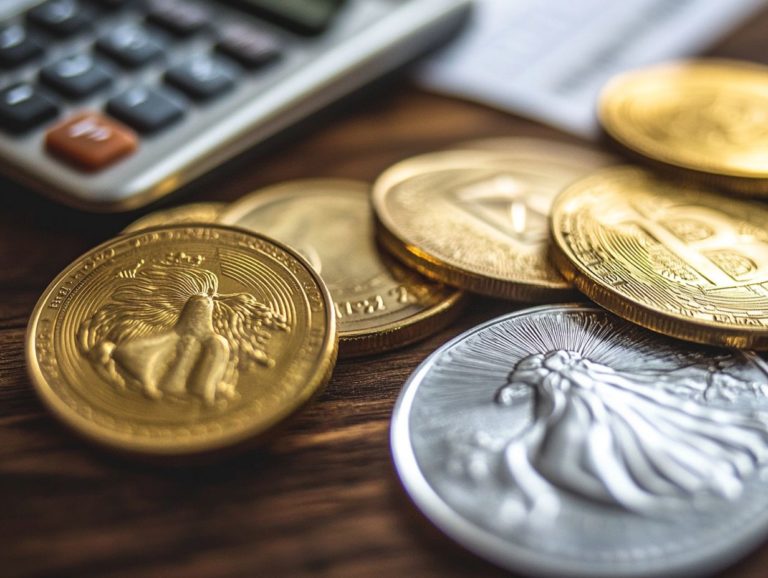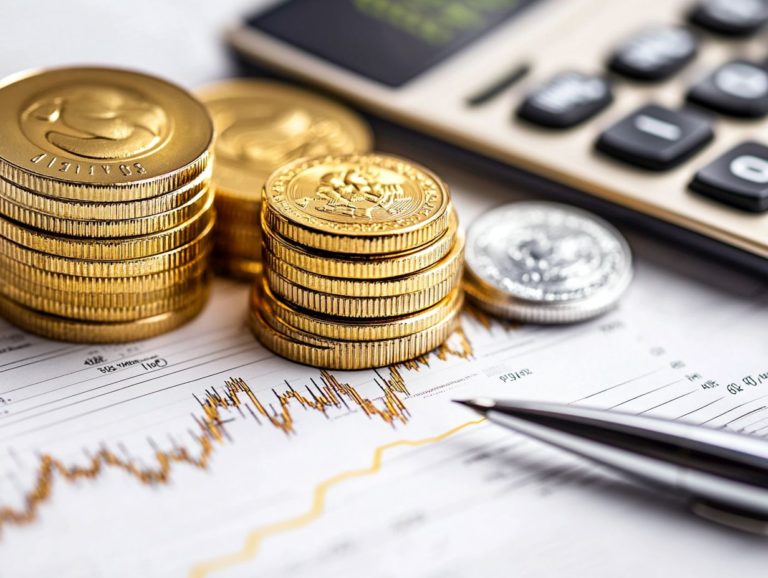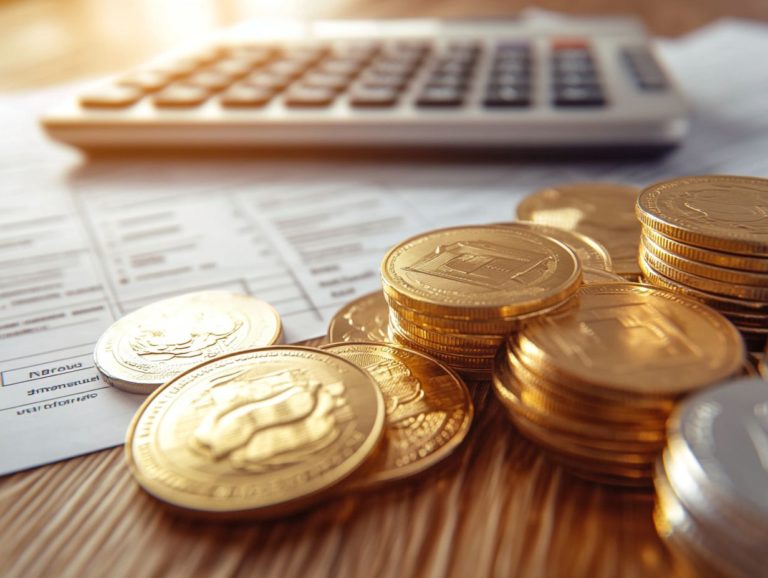How to Minimize Taxes on Precious Metals Sales
Navigating the tax landscape surrounding the sale of precious metals can feel like an intricate puzzle. Whether you re a seasoned investor or just beginning to dip your toes into gold, silver, and platinum, grasping the tax implications is essential for maximizing your profits.
This article will serve as your roadmap, guiding you through various strategies to minimize your tax burden while highlighting accounts that offer tax benefits. You ll gain insights into the optimal times to sell, ensuring you get the most from your sales.
We ll also cover important tax forms and deadlines to keep you compliant and stress-free. By the end, you ll possess the knowledge necessary to make informed decisions and truly optimize your investment journey.
Contents
- Key Takeaways:
- Understanding Taxes on Precious Metals Sales
- Maximizing Tax Savings
- Tax-Advantaged Accounts for Precious Metals
- Selling Precious Metals: Timing and Considerations
- Tax Reporting and Filing for Precious Metals Sales
- Frequently Asked Questions
- What are precious metals and why do they require taxes to be paid on their sales?
- Are there any ways to minimize taxes on precious metals sales?
- Is there a difference in tax rates for different types of precious metals?
- How does holding onto precious metals for a longer period of time help minimize taxes?
- What is a tax-deferred account and how can it help minimize taxes on precious metals sales?
- Are there any tax exemptions or deductions for precious metals sales?
Key Takeaways:

- Be aware of tax implications for selling precious metals. It is subject to capital gains tax and can impact your overall tax burden.
- Utilize tax-saving strategies such as tax-loss harvesting and holding onto your metals for more than a year to reduce the amount of taxes you owe on your sales.
- Consider investing in tax-advantaged accounts like a self-directed IRA or a Roth IRA to minimize taxes on precious metals sales and potentially increase your gains.
Understanding Taxes on Precious Metals Sales
Understanding the tax implications of selling precious metals, such as gold and silver, is essential for you as an investor aiming to maximize your returns. As the value of these tangible assets rises, the potential capital gains the profit from selling an asset can lead to potential taxes owed, largely dictated by IRS regulations.
Armed with this knowledge, you can take charge of your taxes and engage in informed financial planning. This ultimately protects your investment portfolio from unforeseen tax consequences.
Overview of Tax Implications
The tax implications of selling precious metals can shift dramatically based on several factors, including the type of asset and how long you ve owned it, each falling into different capital gains categories.
The distinction between long-term and short-term capital gains is vital in determining tax rates. Short-term gains, which arise when you hold an asset for one year or less, are typically taxed at your ordinary income tax rate, which can be significantly higher. For investors in precious metals, understanding tax compliance for individual precious metals investors is crucial.
On the other hand, long-term gains from assets held for more than a year enjoy preferential rates ranging from 0% to 20%, contingent on your income bracket. It’s worth noting that precious metals like gold, silver, and platinum are classified as collectibles, subjecting them to a maximum tax rate of 28% on gains. This underscores the necessity of grasping the intricacies of understanding the tax effects of precious metals investments in your financial planning.
Maximizing Tax Savings
Maximizing tax savings on your precious metals investments requires a strategic approach that blends careful financial planning with insights from a knowledgeable financial advisor.
By implementing effective capital gains strategies, you can boost your investment returns while minimizing your tax liabilities. Understanding the tax consequences of owning precious metals as a business is crucial in this process. This thoughtful methodology ensures that your financial decisions align with your broader goals, empowering you to navigate the complexities of investment with confidence.
Strategies for Reducing Tax Burden

Reducing the tax burden when selling precious metals is within your reach through a variety of strategic approaches, including tax deferral mechanisms and meticulous portfolio management.
By utilizing tax-advantaged accounts like IRAs or HSAs, you can potentially shield your gains from immediate taxation. Timing becomes a crucial consideration; holding onto assets until you reach a more favorable tax bracket could make a significant difference, especially when considering tax considerations for precious metals in family trusts.
If you have multiple investments, consider consolidating losses from underperforming securities to offset gains from your precious metals sales, thereby effectively lowering your overall taxable income.
Embracing these capital gains strategies not only enhances your financial planning efforts but also empowers you to make more informed investment decisions in the long term.
Tax-Advantaged Accounts for Precious Metals
Tax-advantaged accounts, like IRAs and 401(k)s, present exceptional opportunities for investing in precious metals. These accounts allow you to elevate your investment strategy while effectively managing tax implications.
These accounts create a strong framework for investing. They empower you to control your taxes on profit from sales and minimize tax liabilities with finesse.
Types of Accounts and Benefits
Various types of accounts are available for investing in precious metals, including IRAs and ETFs (Exchange-Traded Funds), each tailored to meet distinct investment strategies and preferences.
These accounts are invaluable tools for both seasoned investors and newcomers eager to diversify their portfolios. For instance, precious metal IRAs offer the significant benefit of tax-deferred growth, allowing you to accumulate capital gains without facing immediate tax implications.
Conversely, ETFs let you buy and sell shares easily on the stock exchange, providing unmatched liquidity and convenience.
Eligibility for these accounts usually hinges on specific guidelines, such as income limits and contribution caps. By incorporating these account types into your investment strategy, you can effectively hedge against inflation and market volatility, while potentially enhancing your long-term returns. Additionally, staying informed about the future of taxation in precious metals investment can further optimize your financial planning.
Selling Precious Metals: Timing and Considerations
Selling precious metals requires careful timing. The right moment can greatly affect your returns and taxes, as market conditions can profoundly influence the market value of your investments and the subsequent taxes on profit from sales.
Savvy investors typically scrutinize trends and economic indicators. This enables you to make informed decisions that harmonize with your overall investment strategy, especially when considering how to handle taxes on precious metals inheritance.
Best Times to Sell and Factors to Consider
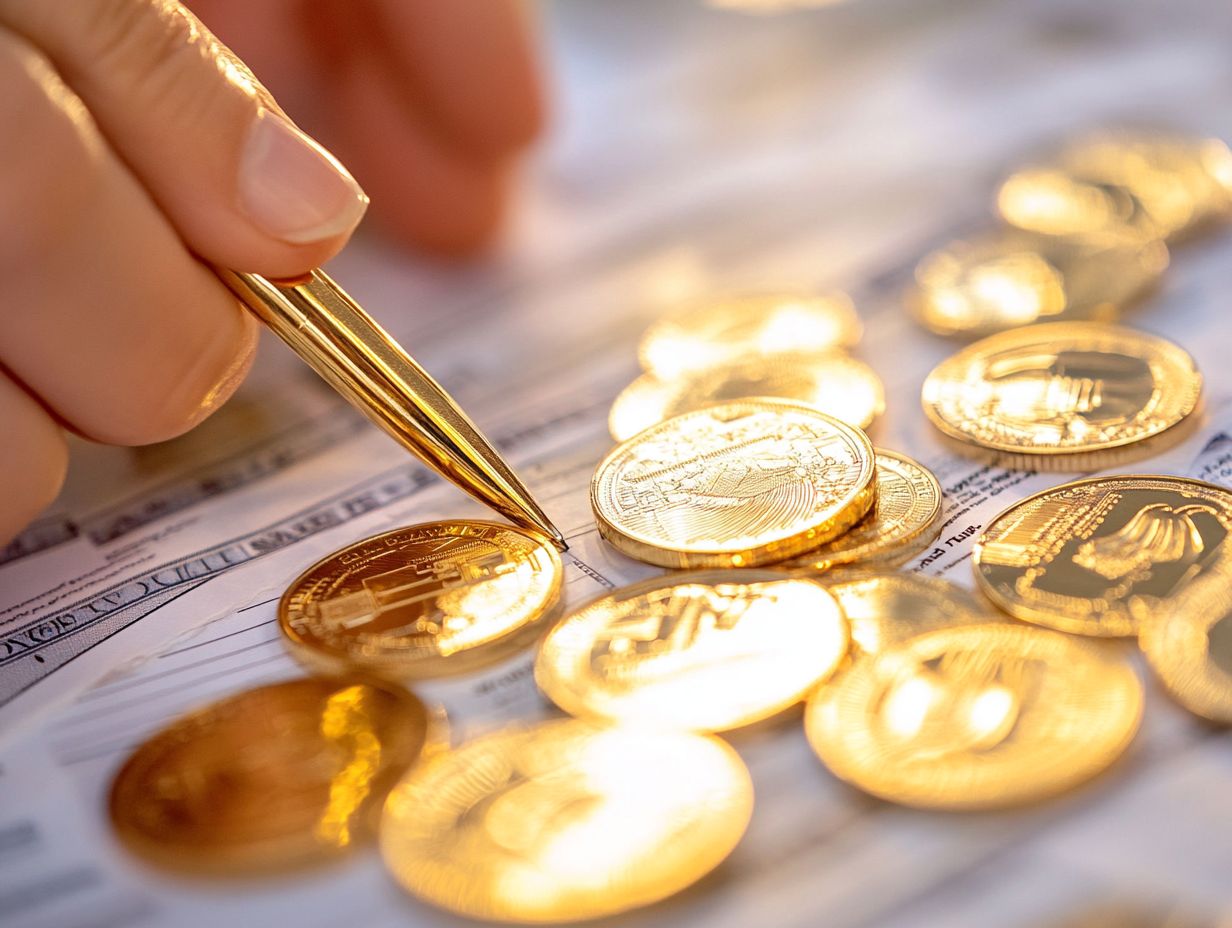
Identifying the optimal moments to sell precious metals requires a keen analysis of current market conditions, historical price trends, and potential economic events that could sway your investment returns.
Several key factors play a vital role in this timing, including economic indicators like inflation rates and interest levels, which can significantly shape investor sentiment. Additionally, understanding the navigating complex tax issues in precious metals investments is crucial, as geopolitical events, such as international conflicts or trade agreements, often lead to demand fluctuations, thereby impacting prices considerably.
Seasonal trends, particularly around holidays and tax seasons, tend to spark surges in buying activity, presenting unique opportunities for savvy sellers. By grasping these dynamics and understanding tax strategies for precious metals in a diversified portfolio, you empower yourself to make informed decisions, ensuring that your transactions align with profit-maximizing strategies while effectively minimizing exposure to market volatility.
Tax Reporting and Filing for Precious Metals Sales
Tax reporting and filing for precious metals sales come with specific IRS requirements that you must navigate to ensure compliance and maintain accurate tax records. Understanding your tax obligations is essential for every investor.
Proper reporting not only aids in accurately calculating your investment taxes but also helps you avoid potential issues with the IRS concerning capital gains transactions.
Important Forms and Deadlines
In terms of filing taxes related to the sale of precious metals, there are several important forms and deadlines you must adhere to in order to comply with IRS regulations.
Understanding that specific forms, like Form 8949 for reporting capital gains and losses, alongside Schedule D to summarize those transactions, is essential for your filing process. Additionally, being aware of the tax benefits of holding precious metals in a trust can also enhance your financial strategy. Mark your calendar for deadlines such as April 15 for most individuals, or the extended deadline of October 15; staying organized and proactive is crucial.
Maintaining accurate records of your purchase receipts, sales invoices, and any associated costs is critical not just for compliance, but also for substantiating your claims and maximizing your deductions. Understanding the tax implications of trading precious metals in the market can further enhance your financial strategy. By managing these details effectively, you can make the filing process significantly more straightforward and far less stressful.
Frequently Asked Questions
What are precious metals and why do they require taxes to be paid on their sales?
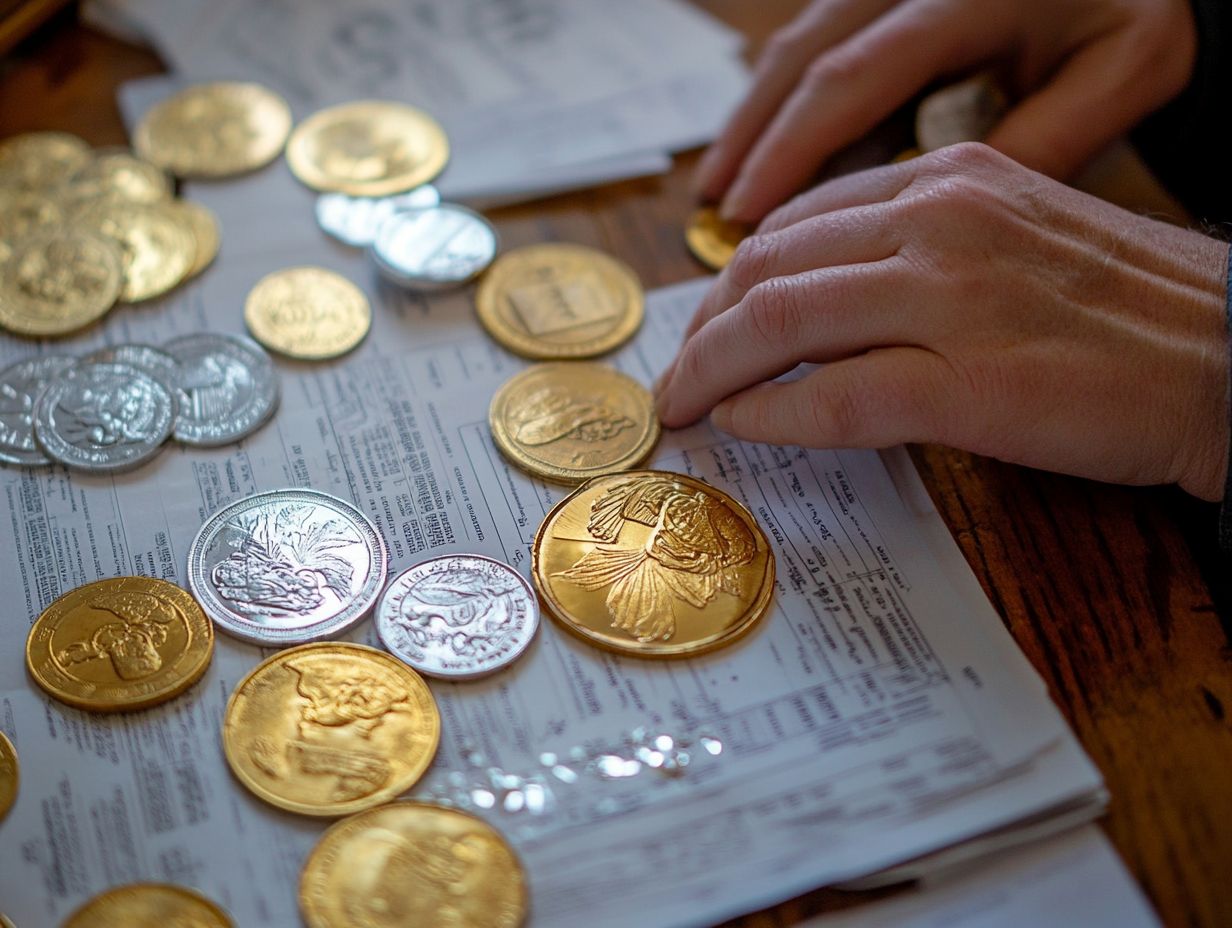
Precious metals refer to rare and valuable metals such as gold, silver, platinum, and palladium. These metals are considered a form of investment and are subject to taxes when sold, just like any other investment.
Are there any ways to minimize taxes on precious metals sales?
Yes, there are strategies to minimize taxes on precious metals sales. For instance, you can hold onto the metals longer or sell them through a retirement account where you don t pay taxes until you withdraw money.
Is there a difference in tax rates for different types of precious metals?
The tax rates for precious metals sales vary depending on the type of metal. For example, long-term capital gains tax rates for gold and silver are typically higher than for other metals like platinum and palladium.
How does holding onto precious metals for a longer period of time help minimize taxes?
Holding onto precious metals for a longer time can help reduce taxes. The longer you hold them, the more they may increase in value.
What is a tax-deferred account and how can it help minimize taxes on precious metals sales?
A tax-deferred account is a retirement account where you don t pay taxes until you withdraw money. This can help minimize taxes on precious metals sales because the profits from the sale can be reinvested without being subject to immediate taxes.
Are there any tax exemptions or deductions for precious metals sales?
Absolutely! You might be thrilled to know there are exemptions and deductions available for precious metals sales, such as the $250,000 capital gains exclusion for primary residence sales or tax deductions for losses on investments.










